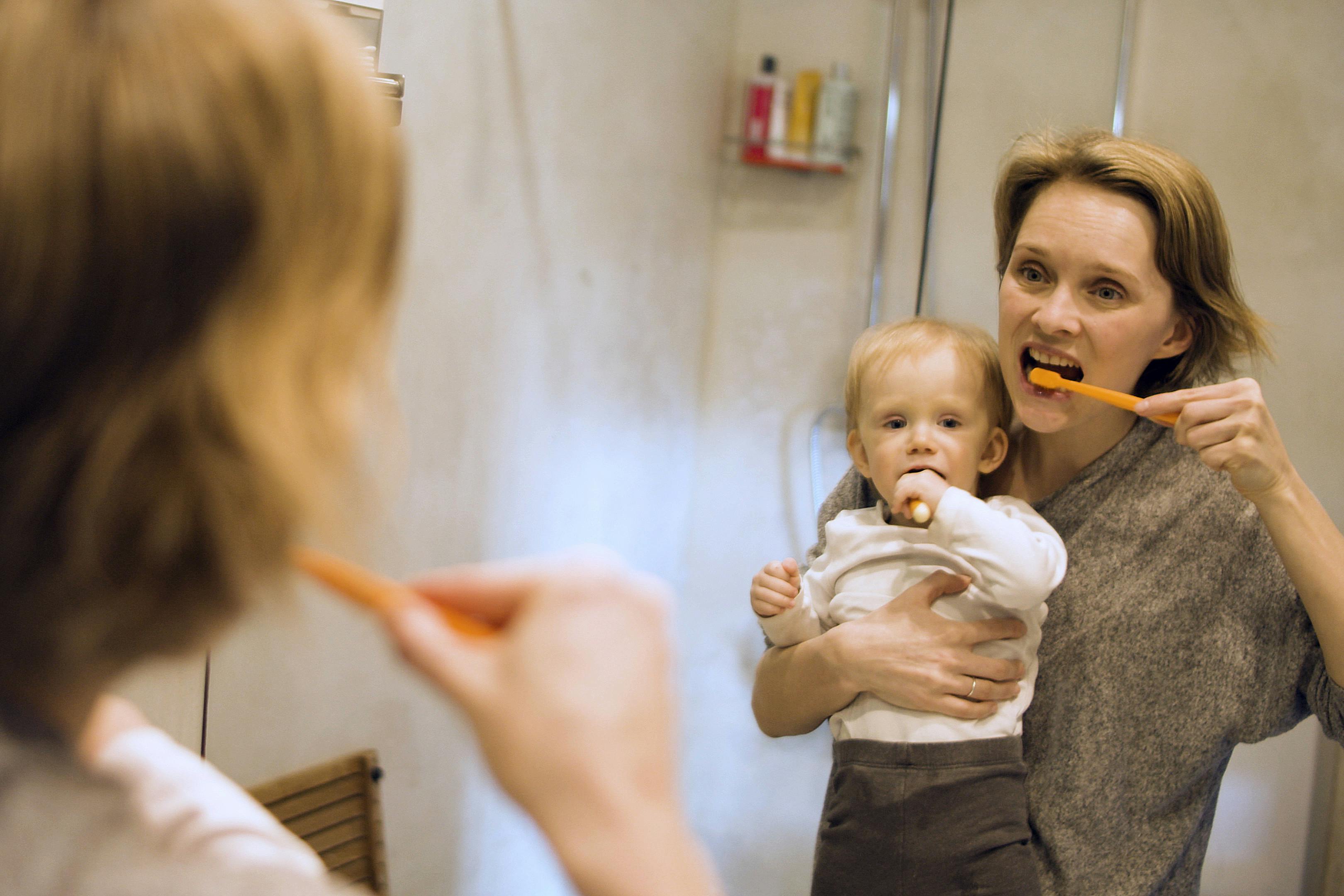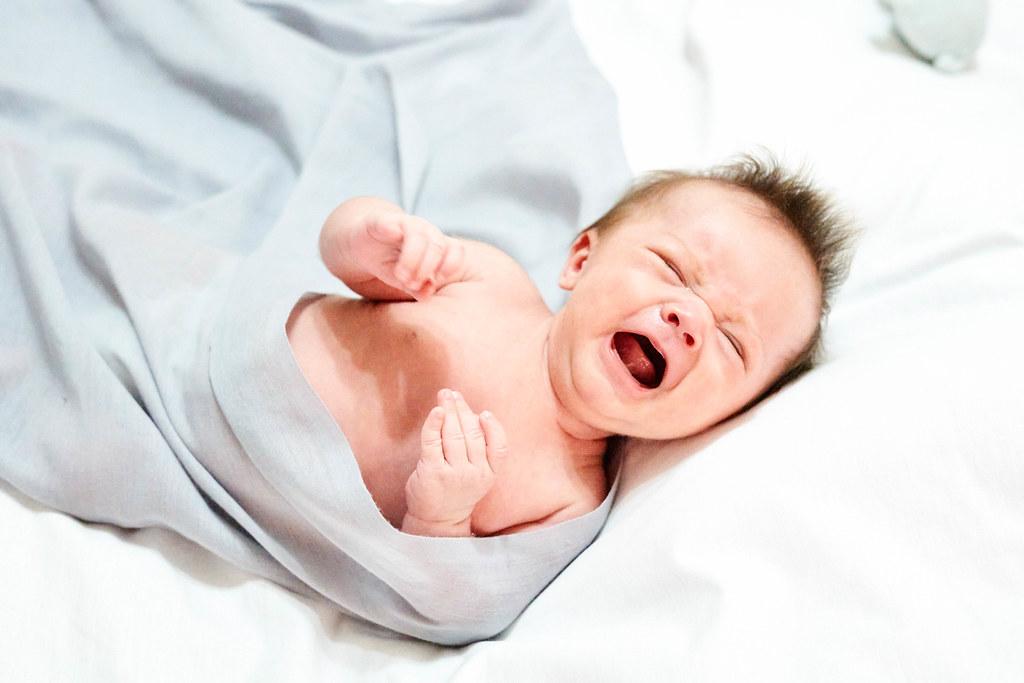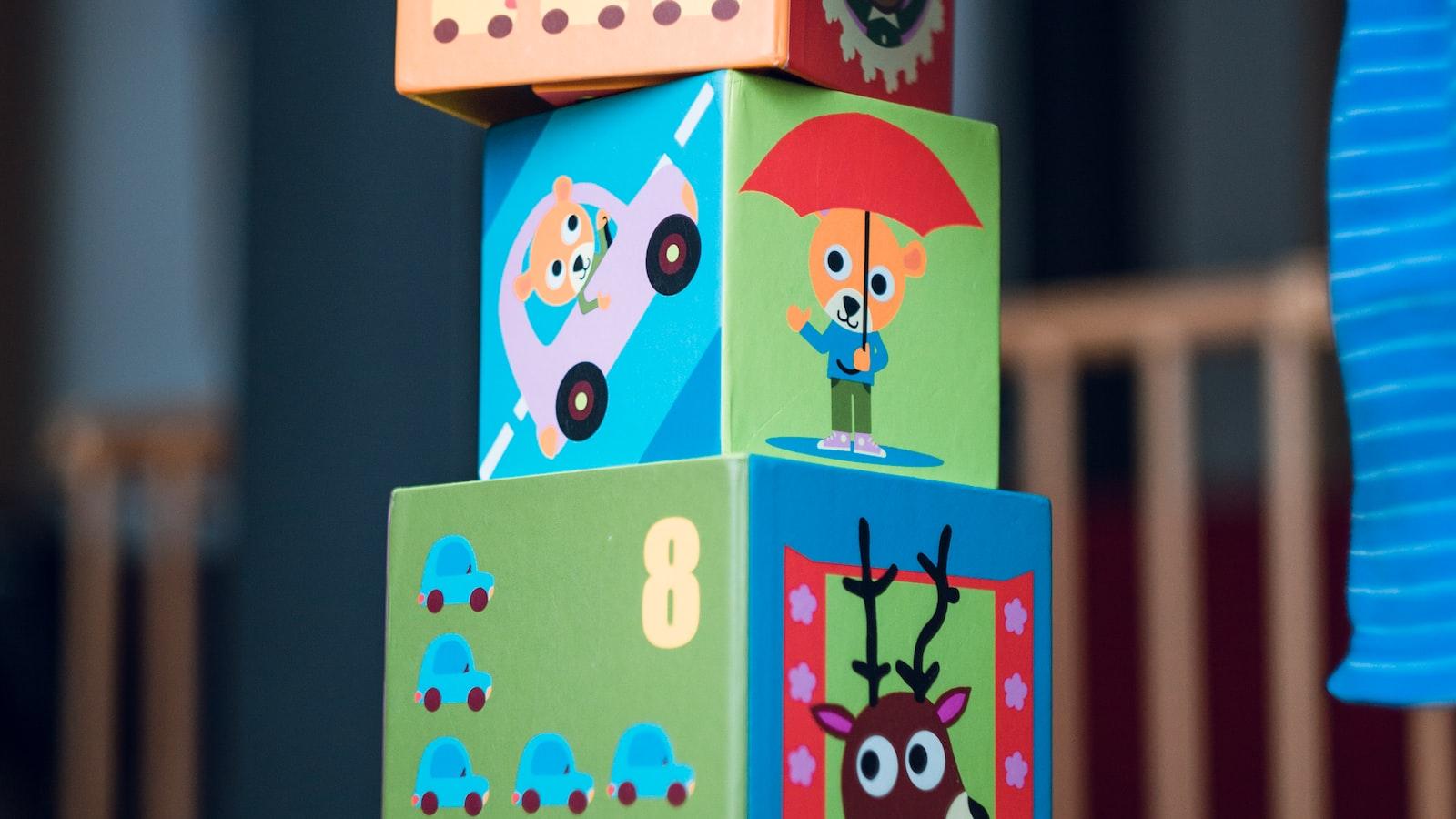It can be very worrying for parents when their baby starts to grind their teeth. Teeth grinding is a common habit among infants and toddlers and can occur during the day or at night while sleeping. While it may not be a sign of serious health concerns, it can still cause trouble for your little one, leading to issues such as difficulty sleeping, ear pain, jaw pain, and headaches. Luckily, there are some simple steps you can take to help your baby stop grinding their teeth. In this article, we will discuss how to get your baby to stop grinding their teeth.Teeth grinding in babies is usually caused by the eruption of new teeth. As the baby’s teeth move through the gums, it can cause discomfort that may lead to teeth grinding. Additionally, teething can cause an increase in saliva production which can also contribute to teeth grinding. Other possible causes of teeth grinding in babies include ear pain, hunger, anxiety or stress, and allergies or sensitivities.
How to Identify Teeth Grinding in Babies?
Teeth grinding, or bruxism, is a condition that affects newborns, infants and toddlers. It is a common habit and can sometimes be a sign of an underlying medical condition. Parents should be aware of the signs and symptoms of teeth grinding in babies, so that they can take steps to help manage the condition.
The most common sign of teeth grinding in babies is a grinding sound coming from the baby’s mouth during sleep or when they are awake. This sound may be accompanied by facial twitching or clenching of the jaw. In some cases, parents may also notice tooth wear on their baby’s teeth caused by grinding.
Other signs that indicate teeth grinding in babies include difficulty sleeping, irritability or fussiness, and waking up with a headache or earache. If your baby exhibits any of these signs or symptoms it is important to have them examined by a doctor as soon as possible.
Babies who grind their teeth may also show signs of teething such as drooling, gum sensitivity and chewing on objects to relieve discomfort. However, if your baby is exhibiting any other signs mentioned above along with teething it is important to consult your doctor for further investigation.
It is important to note that not all cases of teeth grinding in babies are cause for concern. In many cases it is simply a habit that can be managed through lifestyle modifications such as providing soft chewable toys for your baby to chew on during the day and avoiding sugary drinks before bedtime which can promote tooth grinding during sleep.
If your baby’s teeth grinding persists despite lifestyle modifications then it could indicate an underlying medical issue such as acid reflux or allergies which require medical attention and treatment. It is also important to monitor your baby’s diet closely as certain foods may trigger episodes of teeth grinding due to food allergies or sensitivities.
It is important for parents to be aware of the potential causes and symptoms associated with bruxism in babies so they can take steps to help manage the condition if necessary. If you suspect that your baby may be suffering from bruxism then it is essential that you speak to your doctor for advice and treatment options available for managing this condition.
Potential Problems with Baby Teeth Grinding
Baby teeth grinding is a common phenomenon in the early stages of development. While some babies grind their teeth as a way to self-soothe, it can potentially cause problems if it becomes a habit. Teeth grinding can lead to wear and tear on the enamel, which can cause sensitivity and pain in the affected areas. Additionally, excessive grinding may cause misalignment or damage to the jaw joint, resulting in pain and discomfort. In some cases, baby teeth grinding may be indicative of an underlying medical condition, such as acid reflux or allergies. If left untreated, these conditions can lead to more serious health issues. Finally, baby teeth grinding may also be a sign of stress or anxiety. It is important for parents to identify any potential sources of stress that may be causing their child to grind their teeth and find ways to help them cope with it.
It is important for parents to monitor their children’s teeth grinding habits and speak with their pediatrician if they are concerned about any potential problems associated with it. The pediatrician may recommend treatments such as mouthguards or night guards to protect the baby’s teeth from further wear and tear. In some cases, medication may be prescribed to help reduce stress levels or address underlying medical conditions that could be causing the problem. By taking steps to address any potential causes of baby teeth grinding, parents can help ensure their child’s dental health is protected for years to come.
Understanding the Cause of Teeth Grinding
Teeth grinding, also known as bruxism, is a common habit among babies and children. It is typically caused by stress, anxiety, or an abnormal bite. Teething can also trigger teeth grinding in babies, as they may grind their teeth in response to the new sensations they experience when their teeth break through the gums. The habit usually stops on its own as a baby gets older and develops better coping mechanisms for stress. However, if your baby’s teeth grinding persists beyond their toddler years, it is important to consult a dentist or pediatrician to rule out any underlying medical conditions.
How Can You Help Your Baby Stop Grinding Their Teeth?
There are several steps parents can take to help their baby stop grinding their teeth. First and foremost, it is important to identify and address the underlying cause of the bruxism. If your baby’s teeth grinding is due to teething pain, you can provide them with appropriate teething toys or medications that can help reduce discomfort. If it is due to stress or anxiety, you should try to create a calm and relaxed environment for your baby and provide them with plenty of comfort and support. Additionally, massaging your baby’s jaw muscles can help reduce tension that may be causing them to grind their teeth. Lastly, you may want to consider using a mouthguard at night if your baby continues to grind their teeth while sleeping.
Reducing Stress That May Lead to Teeth Grinding in Babies
Teeth grinding, or bruxism, is a common problem in babies. It can be caused by a variety of factors, including stress. Fortunately, there are several ways to reduce the stress that may lead to teeth grinding in babies.
The first step is to create a calming environment for the baby. A quiet and peaceful atmosphere can help reduce stress and make it easier for the baby to relax and fall asleep. Soft music can also be soothing and calming for babies. Parents should also be aware of any outside sources of stress that may be affecting the baby, such as loud noises or bright lights.
Parents should also try to keep their own stress levels in check, as this can have a direct impact on their baby’s level of anxiety and emotional wellbeing. Taking time for self-care is important for both parent and baby. Relaxation techniques such as deep breathing exercises or yoga can be beneficial for both parent and child.
In addition to creating a soothing environment for the baby, parents should also make sure they are providing adequate nutrition and hydration throughout the day. Dehydration can contribute to teeth grinding in babies, so making sure they are getting enough fluids is important. Breastfeeding or formula-feeding on demand will ensure that the baby’s nutritional needs are being met.
Providing lots of physical contact with the baby throughout the day can also help reduce stress levels. Skin-to-skin contact is especially important for newborns, as it helps release oxytocin which is known as “the cuddle hormone” due to its calming effect on both mother and child. Swaddling can also provide comfort to babies who are feeling anxious or overwhelmed by their environment.
Finally, it’s important that parents respond quickly when their baby shows signs of distress or discomfort. Being responsive and providing reassurance can help prevent teeth grinding from developing into a more serious problem in babies.
Overall, there are several ways parents can help reduce the stress that may lead to teeth grinding in their babies, including creating a soothing environment, providing adequate nutrition and hydration throughout the day, offering physical contact with plenty of skin-to-skin time, and being responsive when their baby shows signs of distress or discomfort

Diet and Baby Teeth Grinding
Baby teeth grinding, or bruxism, is a common phenomenon in children that can cause discomfort and even damage to the teeth. While it is normal for babies to grind their teeth occasionally, if it occurs often it can be a sign of an underlying problem. Diet plays an important role in the health of baby teeth, and diet can also influence the severity of teeth grinding.
A poor diet can affect the health of baby teeth in several ways. Not getting enough vitamins and minerals can lead to weak enamel, which makes them more vulnerable to damage from grinding. Eating too many sugary foods increases the risk of tooth decay, which makes grinding even more damaging. Eating a healthy diet with plenty of fruits, vegetables, and whole grains will help ensure that baby’s teeth are strong and healthy.
In addition to promoting good oral health habits, a balanced diet may also help reduce the amount of grinding that babies do. Foods that are high in sugar or acidity can aggravate bruxism because they irritate the delicate tissues inside the mouth. Eating foods with natural calming properties like chamomile tea or oatmeal may help relax the body and reduce clenching or grinding behaviors.
It is important for parents to monitor their child’s diet closely if they are prone to bruxism. Try to limit sugary snacks and drinks as much as possible and make sure your child is getting all of their essential vitamins and minerals from a variety of sources. If you suspect that your child’s bruxism is related to anxiety or stress, talk to your pediatrician about ways you can help them cope with these feelings in healthier ways such as playing outside or engaging in creative activities like art projects.
Overall, good nutrition plays an important role in maintaining healthy baby teeth and minimizing any damage caused by bruxism. Eating a balanced diet with plenty of fruits, vegetables, whole grains, and other nutritious foods will help ensure that your child’s teeth are strong enough to withstand any grinding they may be doing during sleep or while awake. If you have concerns about your child’s bruxism or diet habits, talk to your pediatrician for further advice on how best to support their oral health needs.
Is It Safe for Your Baby To Grind Their Teeth at Night?
Grinding teeth, or bruxism, is a common habit among babies and young children. Generally, it’s nothing to worry about as it can be a normal part of development. In most cases, it is not a sign of any dental problems. However, if your baby is grinding their teeth at night for more than a few nights in a row, or grinding excessively during the day, it may be worth talking to your healthcare provider about.
It’s important to understand that some babies grind their teeth due to stress or anxiety, while others may grind their teeth because of airway issues or allergies. If the grinding continues for more than a few nights in a row, it could be an indication that something else is going on and should be checked out. It’s also important to keep an eye on your baby’s teeth for any signs of wear or damage that might indicate the need for further investigation.
If your baby’s teeth grinding is just occasional and not causing any problems, then there’s usually no need to worry. However, if your baby seems distressed when they are grinding their teeth or if there are signs of wear on their teeth, then you should speak with your healthcare provider about it. They can provide advice on how you can help manage the habit and may even suggest other interventions such as mouth guards or special toothpastes designed for babies who grind their teeth at night.
Baby Teeth Grinding Treatments
When it comes to treating baby teeth grinding, the first line of defense is to try to reduce the stressors that are causing the child’s grinding. If a child has too much sugar or caffeine, reducing their intake can help. In addition, encouraging relaxation techniques such as deep breathing and yoga may help them to relax and reduce symptoms of teeth grinding. If the grinding persists, then there are various treatments available.
The most common treatment for baby teeth grinding is a nightguard. This is a custom-fitted appliance that fits over the top or bottom teeth and helps to protect them from wear and tear caused by grinding. It also helps to reduce the sound of the grinding, which can be disturbing for parents and siblings. It’s important to seek out a qualified dentist or orthodontist for this treatment as it takes an expert eye to fit a nightguard properly.
Another option is muscle relaxants. These are medications that can help relax the jaw muscles so that grinding is reduced or eliminated altogether. These medications are usually taken at night before bedtime in order to maximize their effect on teeth grinding while sleeping.
Finally, there are some alternative treatments available such as acupuncture and acupressure which may be helpful in relieving stress-related teeth grinding in babies and young children. However, these treatments should only be used under the supervision of a qualified healthcare provider as they have not been studied extensively in this population.
In summary, there are various treatments available for baby teeth grinding including reducing stressors, using nightguards, taking muscle relaxants, and exploring alternative therapies such as acupuncture and acupressure. It’s important to consult with your healthcare provider before trying any of these treatments in order to ensure that they are safe and effective for your child’s specific needs.

Conclusion
In conclusion, grinding of the teeth in babies is typically a result of teething or stress. To help your baby stop grinding their teeth, it is important to help them manage their stress and provide distractions to keep them from focusing on their discomfort. You may also consider using mouth guards, night guards, or toothpaste specifically formulated for babies to provide relief from teething-related pain. Finally, it can be helpful to monitor your baby’s sleeping habits and provide a comfortable sleeping environment that will reduce the likelihood of teeth grinding throughout the night.
With patience and understanding, you can help your baby learn healthier behaviors and reduce the frequency of teeth grinding. By taking proactive steps now, you can help ensure that your baby’s dental health is not compromised as they grow older.




